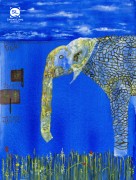Going into “Milk Money,” I was struck by its opening line. So, I’m interested to know: What is it that strikes—that moves—you to write certain stories? Are you moved mostly be certain images? By memory?
This isn’t always the case, but once in a while I’ll have a sudden inkling to jot down something, a line or a scene, and from there, I’ll try to formulate a story around it. For “Milk Money,” it just so happened to be the opening line. Other times it’s an image, or a scene from a TV show, or something that I read in the news—anything that spurs a bit of inspiration.
On that note, do you find that your stories appear fully-formed, or do they develop over time—and even surprise you—in the course of the writing?
In that way, I don’t usually have a fully formed story in my mind when I start the process. Sometimes just a beginning, or an end, or even just a line of dialogue and go from there. Sometimes it goes nowhere. Sometimes it goes in a completely different direction and changes so drastically that I end up cutting the very part I started with. The process is always full of surprises—I think it’s important not to fight them.
What about “Milk Money” in particular? What was the genesis of that?
For “Milk Money,” I was thinking about the way children can get certain ideas “stuck” in their heads, which, on the surface, can be attributed to the ignorance of childhood, but may actually contain something much deeper.
You slipped into the skin of childhood so precisely in your story—into that almost animal violence. Are there other stories, other books, that have struck you with their portrayal of this primal side of childhood?
I love children’s books where the narrator has a bit of omniscience and brings a nuanced perspective, while still maintaining the innocent, poignant naivety and quirkiness of childhood—without “talking down” to the child characters. Tuck Everlasting and Harriet the Spy come to mind, anything by E.B. White or Roald Dahl.
And—I’m always interested in this—do you have any particular writing rituals?
No particular writing rituals to speak of, although I’ve always found it easier to write creatively at night—much less forced than the morning. Easier to get my thoughts together at nighttime, it seems.



 The core workshop of SmokeLong Fitness is all in writing, so you can take part from anywhere at anytime. We are excited about creating a supportive, consistent and structured environment for flash writers to work on their craft in a community. We are thrilled and proud to say that our workshop participants have won, placed, or been listed in every major flash competition. Community works.
The core workshop of SmokeLong Fitness is all in writing, so you can take part from anywhere at anytime. We are excited about creating a supportive, consistent and structured environment for flash writers to work on their craft in a community. We are thrilled and proud to say that our workshop participants have won, placed, or been listed in every major flash competition. Community works.